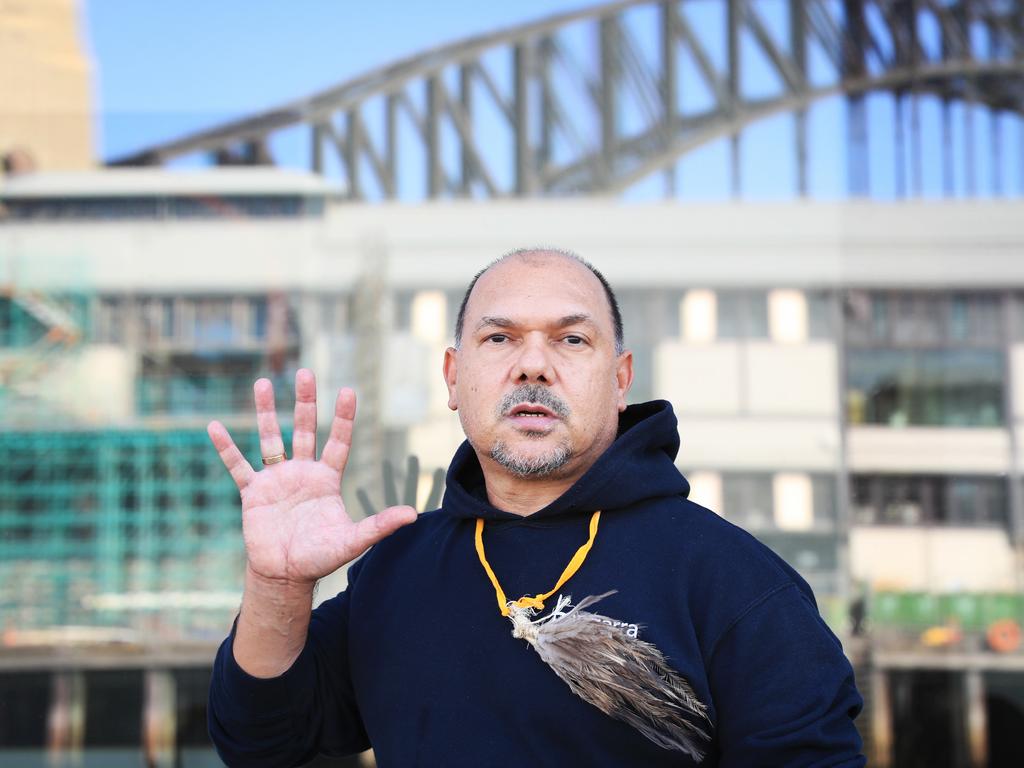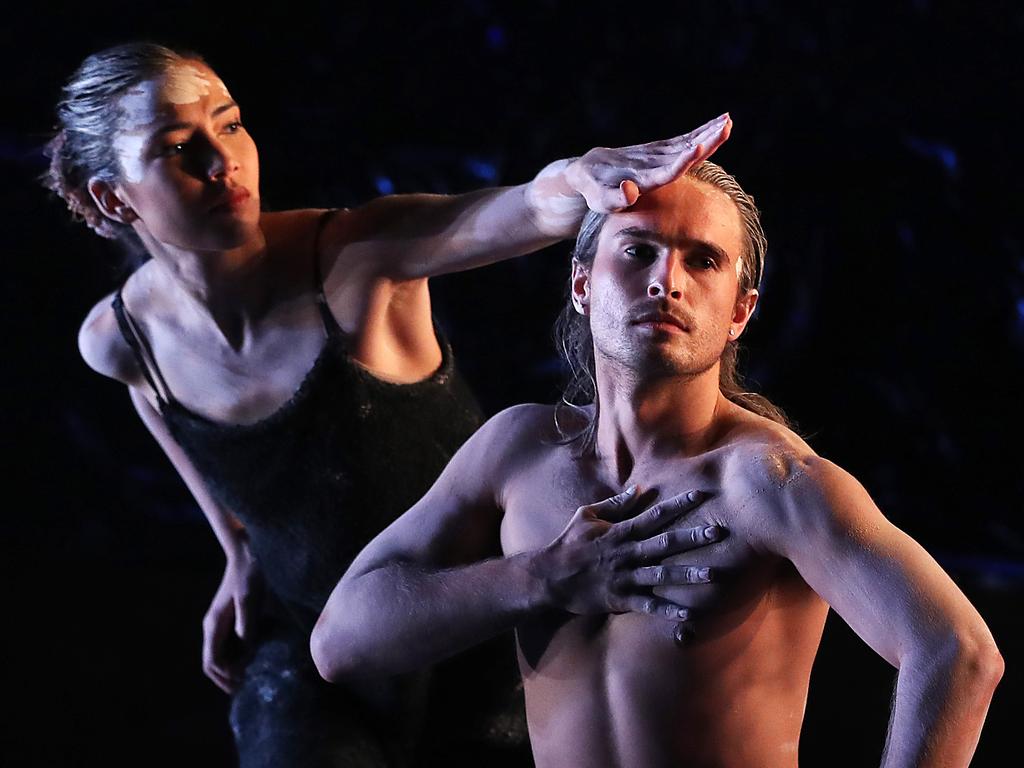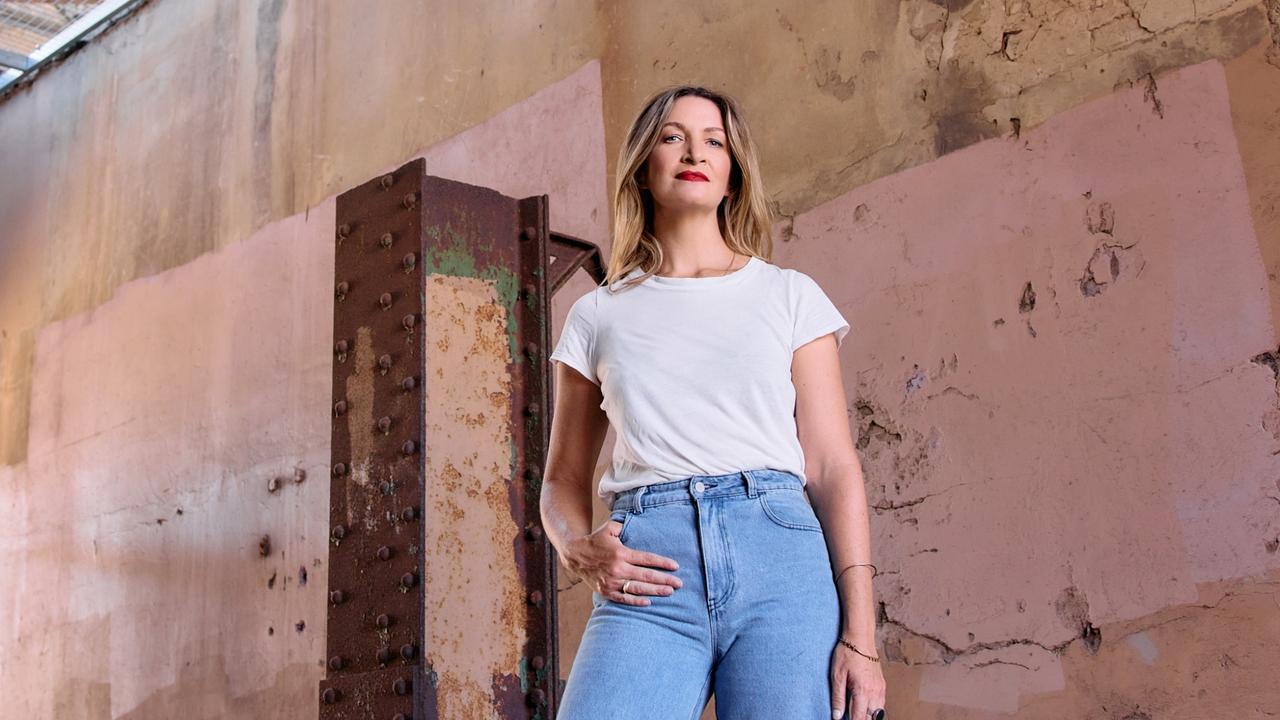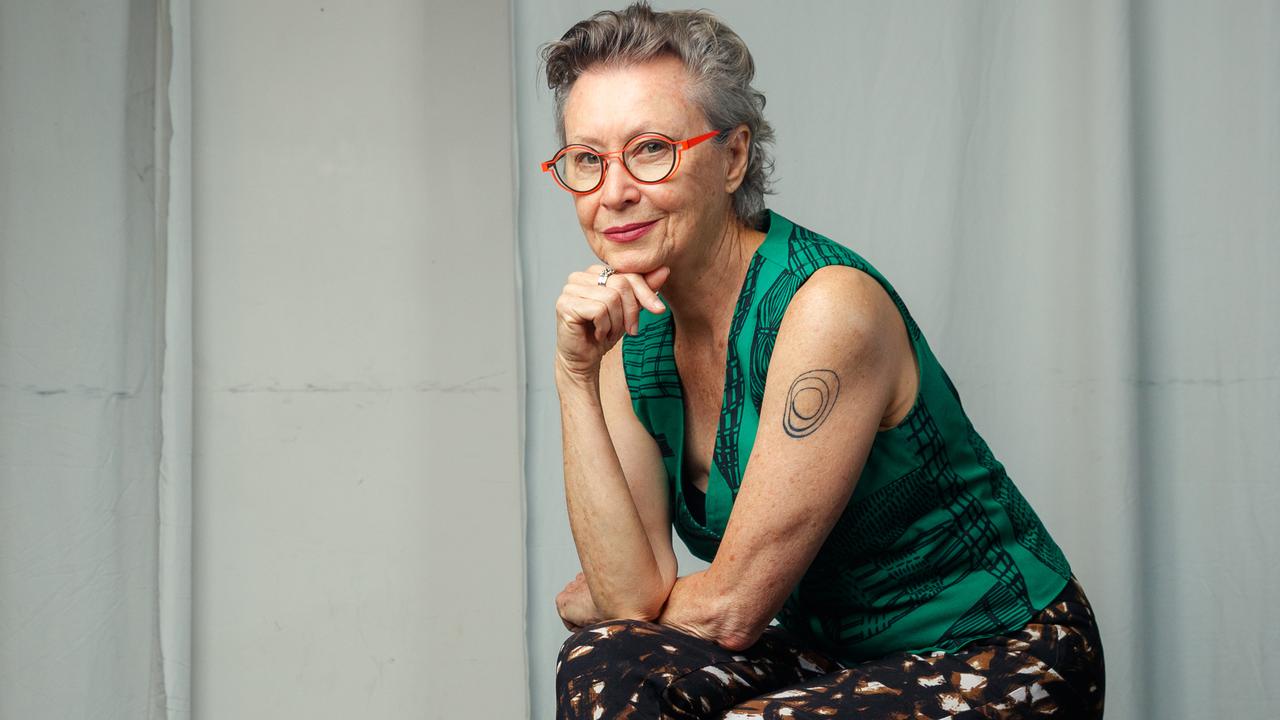Sydney Festival 2022: Stephen Page brings Wudjang language to life
Bangarra’s latest work takes the form of 19 ‘poems’ interwoven through the choreography and aims to inspire the next generation
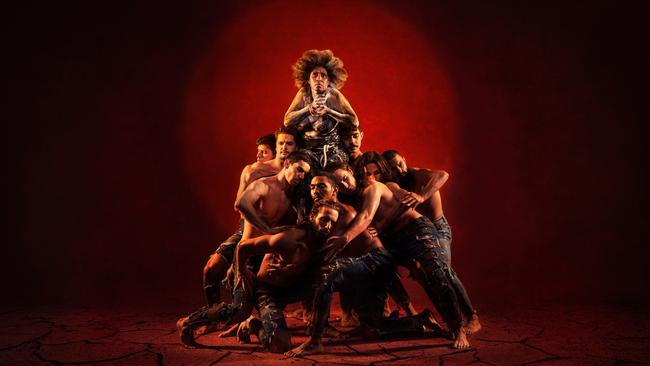
Roy Page never spoke his own language out loud. The Yugambeh man from the Mununjali clan of South East Queensland was forbidden from speaking in his native Mibinyah tongue for fear of retribution.
Stephen Page never even heard his father talk about his childhood, a conversation that was off limits to Page and his 11 siblings growing up in “the Bronx of Queensland”, Mount Gravatt.
“Dad was very private because of his upbringing: hiding from the welfare truck or be taken away. His sisters were taken away and he didn’t see them until eight years later. You don’t talk about that,” Stephen Page says. “But he also had 12 kids, he had to keep a roof over our heads, he and Mum worked four jobs and had these wonderfully dysfunctional kids,” he chuckles.
Of course Page, one of those wonderfully dysfunctional kids, would go on to become a national living treasure, the co-artistic director of the country’s only national Indigenous dance theatre company Bangarra Dance Theatre and a celebrated cultural leader. And now, three decades after he became artistic director and chief choreographer of Bangarra, Page is honouring the memory of his father and bringing alive his language in Wudjang: Not the Past, his most personal and epic production yet.
The 16-strong company of dancers will collaborate for the first time with the Sydney Theatre Company on this ambitious production involving a cast of 25 dancers, actors and live musicians that will debut in January as part of the 2022 Sydney Festival before touring nationally.
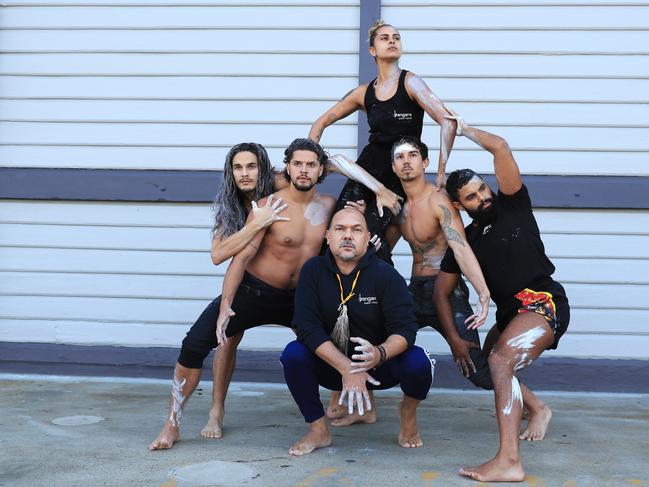
The show opens in darkness, the sound of deep rumbling growing ever stronger and more threatening until the lights come up to reveal the dust and debris that immediately follow a big explosion, here a mining company building a dam that has inadvertently unearthed a pile of human bones.
Yugambeh countryman Bilin (actor Trevor Jamieson) knows he must reinter the bones through a proper ceremony but first needs to teach his niece Gurai (Bangarra dancer Lillian Banks) about the importance of their culture and the significance of taking custodianship over the bones in a respectful way.
As with all Bangarra productions while the opening scene may be a stark reminder of the shocking 2020 Rio Tinto Pilbara Juukan Gorge mining disaster, in which a blast destroyed sacred rock shelters containing evidence of 46,000 years of continual human occupation, the show explores myriad different ideas.
Wudjang: Not the Past is a deeply personal work inspired by Roy Page and largely told in his Mibinyah language. Roy may never have spoken his language out loud but he kept it alive inside his head and on the day he died in 2010 he shared it with Page’s older brother, Bangarra’s composer and musician Roy “David” Page.
“Dad felt safe and comfortable to share that knowledge and language with David, who did a beautiful little song with that Mibinyah language,” says Page. That song formed the basis of Page’s 2018 Commonwealth Games opening ceremony performance involving 60 Elders from the Yugambeh nation; and has now inspired Wudjang: Not the Past, which pays homage to both Roy and David Page, who died in 2016.
On the day The Australian speaks with Page he is at his cheeky, loquacious best. Holed up in his studio at Bangarra’s headquarters in the picturesque harbourside Sydney suburb of Walsh Bay, Page is surrounded by photographs on his pinboard: there’s David Page and younger brother and former Bangarra dancer Russell Page who also died tragically young, in 2002.
Their images sit alongside a picture from SandSong, Bangarra’s critically acclaimed 2021 production co-choreographed by Page and his co-artistic director Frances Rings, a season that was cut short by the lockdowns in Sydney and Melbourne.
Sharing our Zoom screen is Page’s long-time collaborator, dramaturg and playwright Alana Valentine who is based on the NSW South Coast. Page involved Valentine from Wudjang’s earliest days last year, a smart move given the success the pair has had with previous Bangarra productions including the Helpmann Award- winning Bennelong, Dark Emu and Patyegarang among others. Valentine insists she is there merely to help shape the multitude of ideas Page continually conceives, explaining the company’s uniquely collaborative way of working.
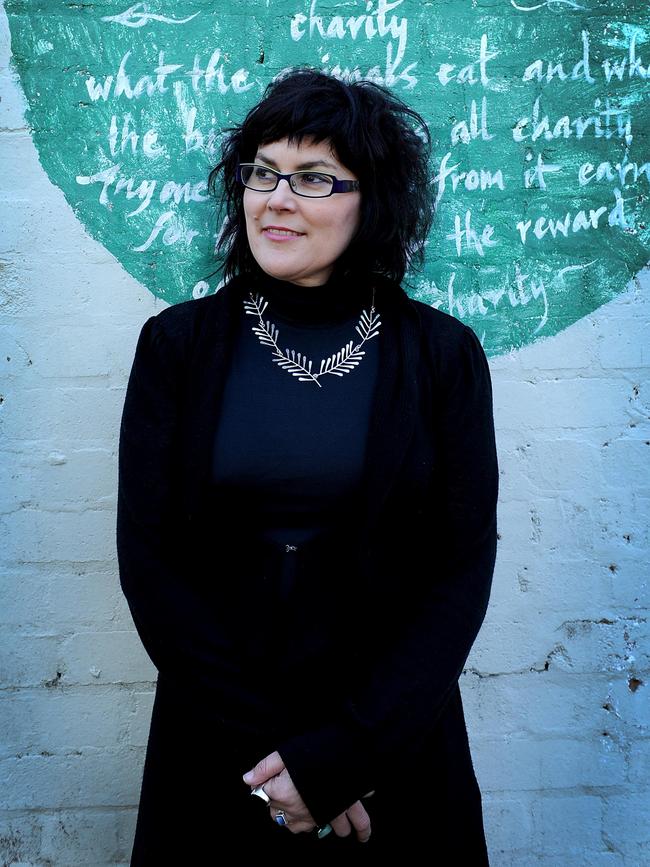
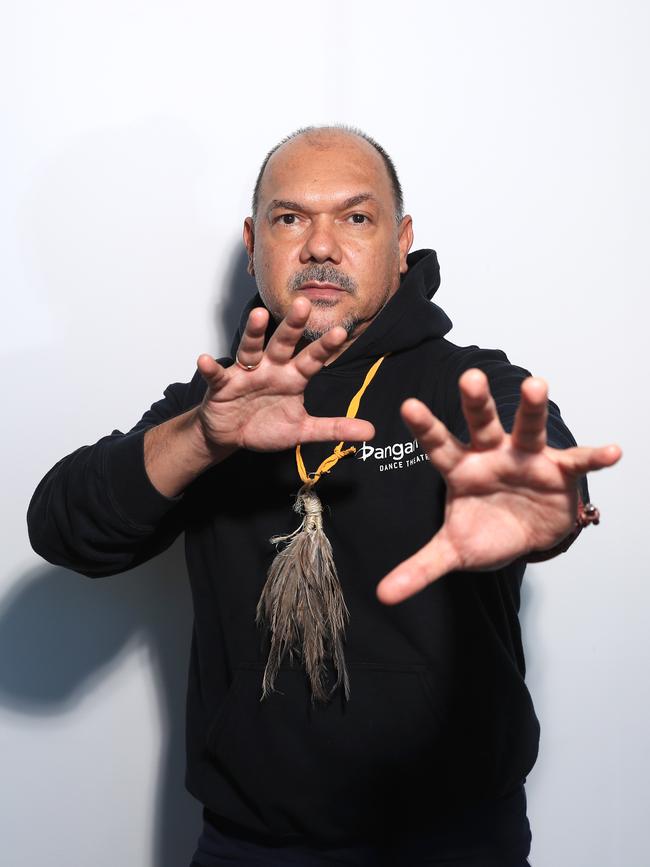
“When you work with Bangarra it’s not a traditional structure of dramaturg or writer,” she says. “Everyone in the company including the creative team snatches bits of Stephen’s creative vision, his mind goes at a million miles an hour and that’s how every show works. It’s an incredibly collaborative process. So what I do a lot of is listen. None of it comes from me, in the sense it’s all in response to the cultural knowledge Stephen is carrying. The same goes for [composer] Steve Francis, [lighting designer] Nick Schlieper and [costume designer] Jenny Irwin.”
Rather than a traditional script, Wudjang: Not the Past takes the form of 19 “poems” devised by Page and Valentine that are spoken in language and English interwoven through the choreography and inspired by stories Page gathered from his father’s country. Assisted by Page’s sister Donna, one of three sisters who have all returned to Queensland and are relearning the language, Page says the stories canvas some of the worst chapters from Australia’s Indigenous past, but also reflect hope and humour.
“Everyone has a massacre, everyone has a displacement, some form of colonialist impact. The stigma doesn’t just live in the past,” says Page, referencing the work’s title Not the Past.
“How did they deal with it from generation to generation? How do they carry that trauma? It’s about resilience, it’s about strength, the power in really believing there’s a connection to land. There are social themes in there, there’s dark humour, it’s our way of storytelling,” he says unapologetically.
In the Mibinyah language, “wudjang” means “mother” or the spirit of mother Earth. Embodied on stage by Bangarra Elder Elma Kris, Wudjang teaches Gurai (young companion spirit) about the importance of connection to land, culture and language.
Wudjang: Not the Past isn’t just about the repatriation of bones. It’s about the repatriation or reclaiming of Indigenous stories, allowing them to be told in their own voice rather than through the pages of white history. Just as Gurai absorbs the lessons from her Elders, so are the younger Bangarra dancers increasingly keen to learn about their own culture and language, often lost in today’s assimilated urban communities.
“There’s such a hunger among the younger generations to learn. They’re proud, it’s not just about putting a black fella flag on their T-shirt, it’s about really understanding their connection to land and story.”
Page is excited by the opportunity to be back on stage after the Covid-induced hiatus, and proud of the show’s large ensemble including actors Jamieson (Storm Boy), Elaine Crombie (Seven Stages of Grieving) and the “poor token white actor Justin Smith (Billy Elliot, the Musical) who [embodies] colonialism and authority” as well as musicians Brendon Boney and Véronique Serret.
Of course the score is crucial and here Valentine thinks regular composer Steve Francis has taken the music to new heights, inspired by and incorporating the “stems” of music David Page so meticulously archived. “David has been a big inspiration,” Page says. “His spirit plants these things and I really do reckon his spirit is pushing this.”
Page is conscious of the diverse populations and issues his works seek to represent. “I’m always hearing black social issues because I’m close to it, someone will send me the latest statistics on black deaths in custodies,” he says.
“We work in an environment professionally where we have a platform to be another way of messaging our voice and our needs. Yes we have a fancy stage with costumes but we’re really trying to get to the heart and spirit of it.”
He was buoyed by the fact that his work with the Mununjali Elders for the Commonwealth Games inspired that community to conduct both young girls and men’s business, and is hopeful Wudjang: Not the Past will have a similar effect.
“I was just lucky to have David and Russell and I truly believe our granny and our ancestors must have said ‘their fate is to connect back to story and storytelling’. But I’m nervous as hell because I feel I have a responsibility to my father, and David, and their conversation.
“ When you walk into your own backyard you have a responsibility to use your platform to tell a story like this, not just for a mainstream audience but also your own mob and community and the next generation. But if someone said would I do it all again? I’d do it all again.”
Wudjang: Not the Past premieres in Sydney from January 14 to February 12.

